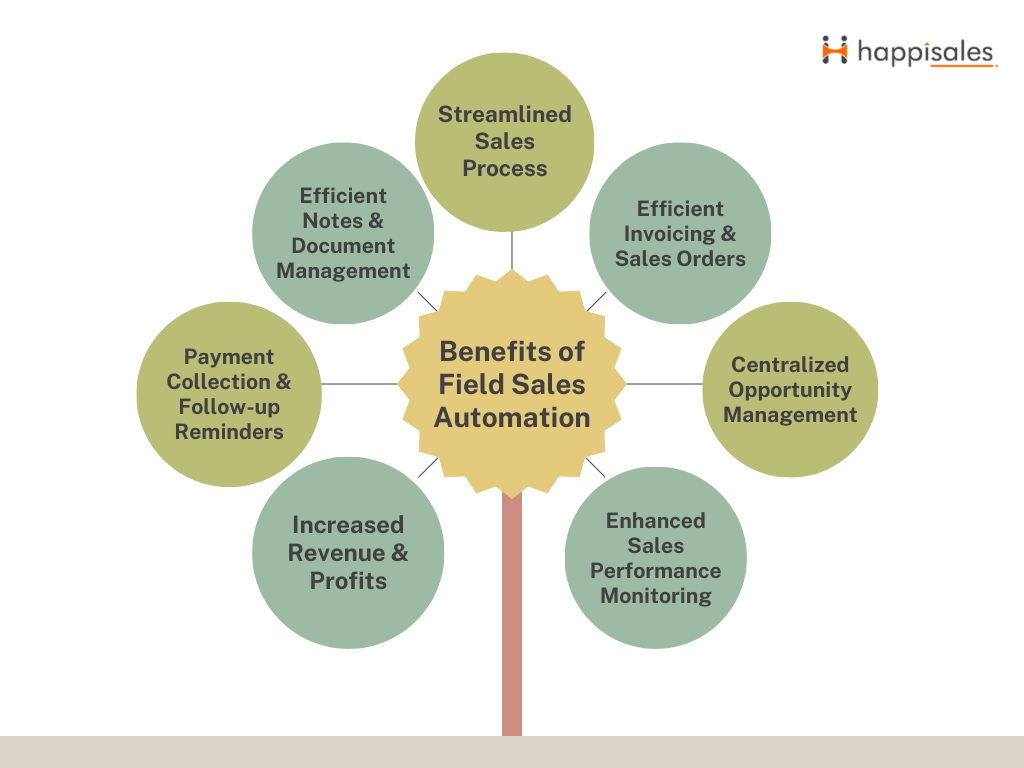How Important is a Highly Productive Field Sales App?

In today’s highly competitive business landscape, having a highly productive field sales team can make all the difference in achieving success. With the advancement of technology, businesses can now leverage field sales apps to automate, plan, track, and monitor their field force’s daily sales routine. In this blog, we will explore the benefits of using dedicated field sales automation software.
Benefits of Field Sales Automation Software
Implementing a field sales app can bring numerous benefits to your business. Let’s explore some of the key advantages:

1. Streamlined Sales Process
A field sales app allows you to track every step of the sales process, ensuring that no critical information is missed. With real-time updates and notifications, you can stay on top of your sales activities and know what needs to be done to close deals effectively.
2. Efficient Invoicing and Sales Orders
Accurate and timely invoicing is crucial for any business. A field sales app enables you to generate accurate invoices and sales orders quickly, regardless of the number of products or services sold. This ensures that you maximize revenue and avoid any discrepancies in financial transactions.
3. Centralized Opportunity Management
Managing multiple opportunities from various sources can be challenging. However, with a field sales app, you can consolidate all your opportunities in one place, providing easy access for your sales team. This allows for better collaboration and ensures that no potential sales leads slip through the cracks.
4. Enhanced Sales Performance Monitoring
Tracking and analyzing sales performance is essential for improving productivity. A field sales app provides valuable insights into your team’s performance, allowing you to identify top-performing individuals and areas for improvement. With this information, you can optimize your sales strategies and allocate resources effectively.
5. Increased Revenue and Profits
By leveraging a field sales app, organizations can increase revenue and profits through improved customer insights, optimized sales processes, and better product recommendations. With access to customer feedback, order history, and stock inventory, you can make data-driven decisions to drive sales growth.
6. Payment Collection and Follow-up Reminders
Collecting payments from clients on time is crucial for maintaining a healthy cash flow. A field sales app can send automated payment collection reminders, ensuring that you never miss a payment deadline. This feature helps you streamline your financial operations and avoid revenue loss.
7. Efficient Notes and Document Management
Keeping track of important sales-related information is essential for effective sales management. A field sales app allows you to maintain notes and documents related to customer orders, meeting details, and other critical information. This centralized storage ensures that you have easy access to relevant information whenever needed.
Picking the Right Field Sales App
Now that we understand the benefits of a field sales app, let’s explore the key parameters we need to consider to pick the ideal field sales app for your business.
1. Define Your Goals and Objectives
Before looking for different sales app options, it’s crucial to define your goals and objectives for the field sales app. Identify the specific pain points you want to address, such as improving sales efficiency, enhancing the customer experience, or streamlining communication. Clearly defining your goals will help you make the right choice.
2. Identify Key Features and Functionality
Based on your defined goals, identify the key features and functionality that your field sales app should have. Some essential features may include lead distribution, sales territory management, GPS tracking, task assignment, performance analytics, and offline capabilities. Prioritize features based on their impact on your sales processes and align them with your business requirements.
3. An Intuitive User Interface
A user-friendly interface is crucial for ensuring that your field sales team can easily navigate and utilize the app’s features. An intuitive user interface that allows for seamless navigation between different sections of the app is important.
4. Develop Robust Data Management and Integration
Efficient data management is essential for a successful field sales app. Ensure that your app can capture and store critical data, such as customer information, sales activities, and performance metrics. Integration with existing CRM systems and other relevant tools is also vital to streamline data flow and avoid duplication of efforts.
5. Real-Time Communication and Collaboration Features
Facilitating real-time communication and collaboration among your field sales team is crucial for effective coordination and improved productivity. Implement features such as instant messaging, task assignments, and notifications to keep your team members connected and informed. This ensures that they can respond promptly to new leads, updates, and customer requests.
6. GPS Tracking and Mapping Functionality
GPS tracking and mapping functionality are essential for monitoring the location and activities of your field sales team. Integrate GPS capabilities into your app to provide real-time updates on your team’s location, sales routes, and completed tasks. This not only helps optimize travel routes but also provides valuable insights into field operations.
7. Offline Capabilities
Field sales often involve areas with limited or no internet connectivity. Ensure that the sales app has offline capabilities, allowing your sales team to access and update information even without an internet connection. This ensures uninterrupted productivity and eliminates dependency on network availability.
8. Test and Iterate
Thoroughly test the field sales app during the trial period. Gather feedback from your sales team, and try to jot down the gaps. Make sure that the app meets the specific needs of your sales team and delivers optimal performance.
9. Provide Training and Support
Once you have picked the right field sales app, make sure that comprehensive training and support are provided to your sales team. Enroll in training sessions to familiarize them with the app’s features and functionality. Additionally, establish a support system to address any issues or questions that arise during app usage. Regularly gather feedback to identify areas for improvement.
10. Continuously Monitor Performance and Analyze Data
After implementing your field sales app, continuously monitor its performance and analyze the data it generates. Track key performance indicators, such as sales metrics, lead conversion rates, and customer satisfaction. Leverage the insights gained from the app’s analytics to identify areas for improvement and optimize your sales strategies.
11. An App that Regularly Updates and Improves
Technology and business requirements are constantly evolving, and so should your field sales app. Make sure your app stays up-to-date and keeps incorporating new features, addressing user feedback, and staying aligned with industry trends. Continuous improvement ensures that the app remains effective and supports your sales team’s productivity in the long run.
By leveraging the benefits of field sales automation software, you can streamline your sales processes, enhance team collaboration, and drive revenue growth. Book a demo to check out our field sales app, Happisales, and understand how effective and efficient your field sales team can get using it.